Add this eBook to your basket to receive access to all 2,615 records. Our indexes include entries for the spelling wells. In the period you have requested, we have the following 2,615 records (displaying 1,931 to 1,940): These sample scans are from the original record. You will get scans of the full pages or articles where the surname you searched for has been found. Your web browser may prevent the sample windows from opening; in this case please change your browser settings to allow pop-up windows from this site.  Outstanding soldiers of the 66th (Berkshire) Regiment of Foot
(1870-1875) Outstanding soldiers of the 66th (Berkshire) Regiment of Foot
(1870-1875)
Each year just a handful of outstanding soldiers of the regiment were chosen for good conduct medals and gratuities: these are listed here. There were two lists, one for men recommended for the Good Conduct Medal without a gratuity, and one for gratuities - £5 to a private, £10 to a corporal, and £15 to a serjeant. Both lists are indexed here, and each gives rank, name, regimental number, date of recommendation and date of issue. (The sample scan is from the 32nd foot). The regiment was sent out from Ireland to the East Indies in 1870. | Sample scan, click to enlarge
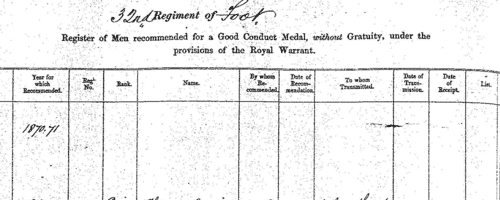
|  Outstanding soldiers of the 6th (The Royal 1st Warwickshire) Regiment of Foot
(1870-1875) Outstanding soldiers of the 6th (The Royal 1st Warwickshire) Regiment of Foot
(1870-1875)
Each year just a handful of outstanding soldiers of the regiment were chosen for good conduct medals and gratuities: these are listed here. There were two lists, one for men recommended for the Good Conduct Medal without a gratuity, and one for gratuities - £5 to a private, £10 to a corporal, and £15 to a serjeant. Both lists are indexed here, and each gives rank, name, regimental number, date of recommendation and date of issue. (The sample scan is from the 32nd foot) | Sample scan, click to enlarge
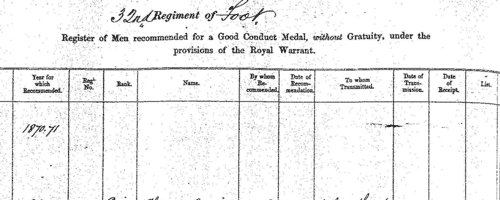
|  Outstanding soldiers of the 90th (Perthshire Volunteers - Light Infantry) Regiment of Foot
(1870-1875) Outstanding soldiers of the 90th (Perthshire Volunteers - Light Infantry) Regiment of Foot
(1870-1875)
Each year just a handful of outstanding soldiers of the regiment were chosen for good conduct medals and gratuities: these are listed here. There were two lists, one for men recommended for the Good Conduct Medal without a gratuity, and one for gratuities - £5 to a private, £10 to a corporal, and £15 to a serjeant. Both lists are indexed here, and each gives rank, name, regimental number, date of recommendation and date of issue. (The sample scan is from the 32nd foot). | Sample scan, click to enlarge
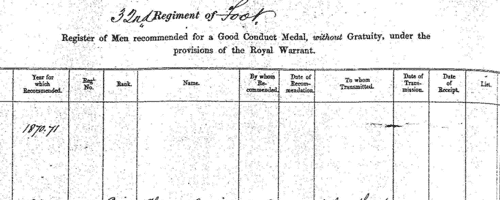
| Freeholders in county Carlow
(1873-1875)
Owners of an acre or more, whether resident there or elsewhere: with their addresses; the acreage; and a valuation of the land. The survey commenced in February 1873, the last returns being received in November 1875. | Sample scan, click to enlarge
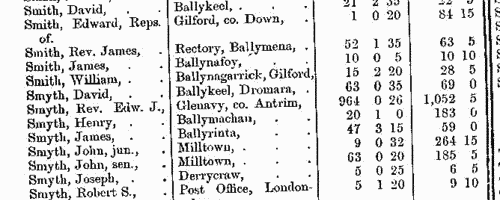
| Boys entering Merchant Taylors' School in London
(1875)
Merchant Taylors' School was founded by members of the livery company of the merchant taylors of the city of London in 1561 as a grammar school. By the 19th century this was a major English public school. In 1875 the school removed from Suffolk Lane, in the City, to a new building in Charterhouse Square in Finsbury. In 1907 the Reverend William Baker, a former headmaster, published this school register for the period 1871 to 1900, which we have indexed by year of admission. Each entry gives the boy's name in full (surname, christian name(s)); date of birth; names of both parents (middle names as initials); occupation of father; career summary; and (in italics) address as of 1907. | Sample scan, click to enlarge

| Boys entering Uppingham School
(1875)
The public school at Uppingham in Rutland was founded by Archdeacon Johnson in 1584. A roll of scholars from 1824 to 1905 was edited by J. P. Graham, and published in 1906. This was a revision and updating of an 1894 edition of the roll, the great bulk of the work having been done by Mrs Mullins. The roll is arranged by year, and within each year by term of entrance, and then alphabetically by surname within each term. Each boy's name is given, surname first, with an asterisk where known (in 1906) to have died. Then there is month and year of birth, father's name (most often just surname and initials) and address (at entrance). Where the boy represented the school at Rugby football (XV) or cricket (XI), that is indicated. After the month and year of leaving the school, there is a brief summary of achievements in later life, and, where known, address as in 1906. From 1875 onwards the house within the school is also noted, with these abbreviations: A., Mr Constable's House; B., Brooklands; C., West Bank; E., Mr J. Gale Thring's House; F., Fircroft; Fgh., Farleigh; H., Highfield; L., The Lodge; L. H., Lorne House; M., Meadhurst; N., The Hall; R., Redgate; R. H., Red House; S., School House; and W. D., West Deyne. | Sample scan, click to enlarge
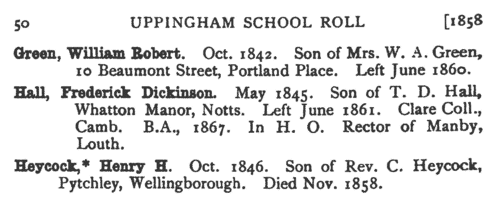
| Petroleum Licences: Rotherhithe
(1875)
Under the provisions of the Petroleum Act of 1871, the London Metropolitan Board of Works was given the power to grant annual licences to the owners of premises which had been inspected and certified as fit for the storage of petroleum. The lists state parish or district; name (surname first); case number; address (including house number); quantity to be kept, in gallons, and the nature of the storage facility. July to December 1875. | Sample scan, click to enlarge

| Petroleum Licences: St Giles
(1875)
Under the provisions of the Petroleum Act of 1871, the London Metropolitan Board of Works was given the power to grant annual licences to the owners of premises which had been inspected and certified as fit for the storage of petroleum. The lists state parish or district; name (surname first); case number; address (including house number); quantity to be kept, in gallons, and the nature of the storage facility. July to December 1875. | Sample scan, click to enlarge

| Pupil Teachers training to become masters in Elementary Schools
(1875)
The Education Department set examinations for candidates for admission into training colleges, and to become teachers. This is the class list (in order of merit) of the men who took the examination to become masters in elementary schools at Christmas 1875. The candidates' names are listed alphabetically by surname within each division, with school in which engaged (N. for National School, Ch. Church of England, B. British School, W. Wesleyan, R. Roman Catholic, P. Parochial, Bd. Board School, Indl. Industrial School). (The sample scan is from a general class list for schoolmistresses) | Sample scan, click to enlarge
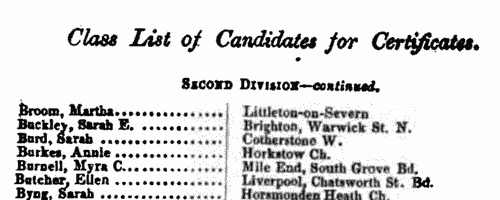
| Pupil Teachers training to become mistresses in Elementary Schools
(1875)
The Education Department set examinations for candidates for admission into training colleges, and to become teachers. This is the class list (in order of merit) of the men who took the examination to become mistresses in elementary schools at Christmas 1875. The candidates' names are listed alphabetically by surname within each division, with school in which engaged (N. for National School, Ch. Church of England, B. British School, W. Wesleyan, R. Roman Catholic, P. Parochial, Bd. Board School, Indl. Industrial School). (The sample scan is from a general class list for schoolmistresses) | Sample scan, click to enlarge
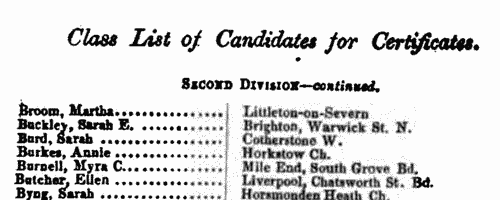
|
Research your ancestry, family history, genealogy and one-name study by direct access to original records and archives indexed by surname.
|












